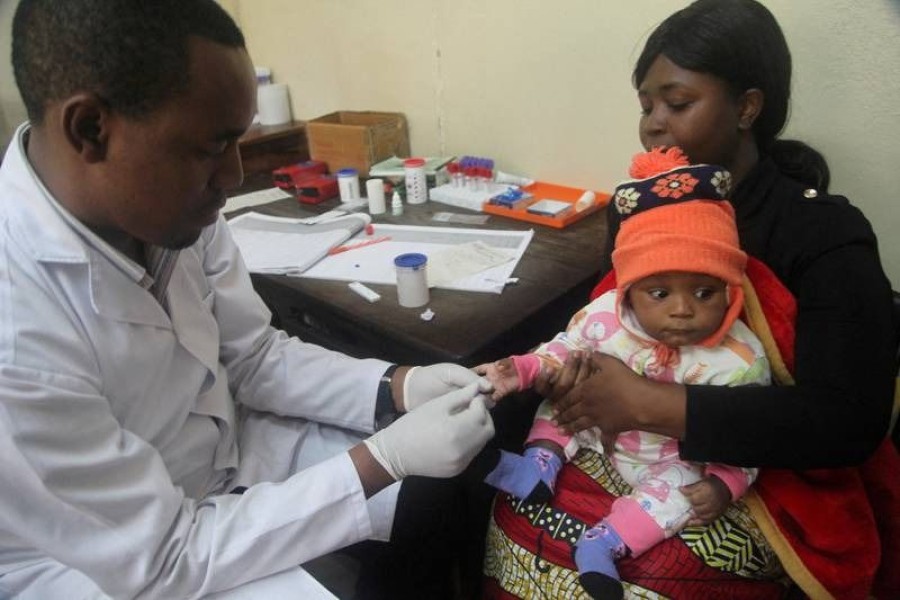New malaria vaccine found to be 75 per cent effective
07 February, 2024

A vaccine developed by the University of Oxford and Serum Institute of India is 75 per cent effective in preventing symptomatic malaria cases in young children.
Final-stage trial results involving 4,800 children in four African countries found the shot prevented three quarters of malaria cases in children aged between five and 36 months in areas where the initial three doses were given before peak malaria season.
In areas where transmission happens all year it prevented 68 per cent of cases.
Malaria kills more than 400,000 people each year, including more than 260,000 aged under five in sub-Saharan Africa.
The disease is caused by a single-cell parasite, Plasmodium falciparum, which is neither a virus nor a bacterium, and is transmitted to people by infected mosquitoes.
Read More : Chance discovery helps fight against malaria
When a mosquito injects a person with anticoagulant saliva – to stop their blood from clotting – a form of the parasite known as a sporozoite is transmitted into the person’s bloodstream. Sporozoites travel to the liver, where they multiply, before entering red blood cells and replicating further, releasing another form of the parasite.Disease symptoms are caused by the parasite’s effects on these red blood cells.
Subsequently, mosquitoes are infected when they ingest yet another form of Plasmodium falciparum when they feed on the blood of infected people, and the cycle continues.
The University of Oxford and the Serum Institute of India vaccine has already been approved for use by regulators in three West African countries and the WHO. It is the second to become available against the mosquito-borne disease this year.
“This is what we have been waiting for, for decades,” said Mary Hamel, the WHO’s malaria vaccine implantation head. She said having two safe and effective malaria vaccines was important to meet demand.
The first vaccine was launched in Cameroon earlier this month and was developed by the drugmaker GSK.
Both vaccines have the potential to make huge inroads against an ancient mosquito-borne disease that still kills more than half a million people, mainly young children in sub-Saharan Africa, every year.
The final-stage trial results for the Oxford and Serum shot, known as R21, were published in The Lancet medical journal.
The investigators said that efficacy was maintained with a booster a year later, although the protection appears to wane over time. The trial is ongoing.
“It’s something else we can add in,” said Brian Greenwood, a professor at the London School of Hygiene and Tropical Medicine who has worked on the vaccines for decades.
“Now what’s needed is learning how to use these vaccines best,” he added, referring to the potential need for regular boosters as well as combining the shots with preventive drugs and tools like bed nets.
He and other experts said comparing the two vaccines head-to-head was difficult because of the many variables involved in the trials, including the age of the children vaccinated and the length of time they were studied for, the coverage of preventive drugs given alongside the shots, and the levels of malaria transmission in an area, among other elements.
Despite suggestions that R21 is uniquely protective, when the vaccines are compared under the same conditions, their performance is similar, the experts said - a conclusion endorsed by WHO.
The key difference is that the new R21 shot is cheaper, at about $3 a dose, and more readily available.
There are only 18 million doses of GSK’s vaccine available up to 2026, but 25 million doses of R21 have already been produced by Serum for this year, chief executive Adar Poonawalla said ahead of the results. The shot also includes an adjuvant, or immune-boosting portion, made by Novavax.
“There is no capacity issue, and we will provide further updates in three to four months as more countries express demand,” he said.
Alassane Dicko, who led the R21 trial in Mali, said the vaccines should be deployed as soon as possible. "What we need to do now is get the vaccines to children," he said.
Source: www.thenationalnews.com
